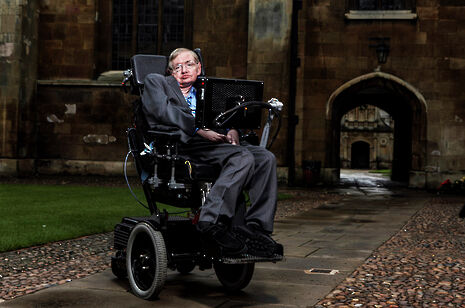Stephen Hawking condemns Brexit and Trump
‘Gone are the days when we could stand on our own, against the world,’ says the renowned Gonville and Caius physicist

Famed University of Cambridge scientist Stephen Hawking has reinforced his opposition to Britain leaving the European Union, and has condemned US Republican Presidential candidate Donald Trump as a “demagogue”.
Speaking on ITV’s Good Morning Britain, the theoretical physicist reiterated his hope that Britain will continue to be a member of the EU after the referendum on 23rd June. In March, Hawking – who founded Cambridge’s Centre for Theoretical Cosmology – and 150 other Royal Society members signed an open letter saying Brexit would be a “disaster for UK science”.
“Gone are the days when we could stand on our own, against the world,” Hawking said on the show. “We need to be part of a larger group of nations, both for our security and our trade. The possibility of our leaving the EU has already led to a sharp fall in the pound, because the markets judge that it will damage our economy.”
As numerous senior figures within Cambridge have done, Hawking placed an emphasis upon the benefits which come from EU students being able to easily study in the UK.

“Students can come here from EU countries to study, and our students can go to other EU universities. More importantly, at the level of research, the exchange of people enables skills to transfer more quickly, and brings new people with different ideas, derived from their different backgrounds,” he said.
He also cited the benefits to Britain in terms of research funding, saying: “The other reason is financial. The European Research Council has given large grants to UK institutions, either to foster or promote exchanges.”
Hawking, who is known throughout the world for his work on black holes among other physical phenomena, was also asked if he could explain why Donald Trump, now the presumptive Republican candidate for President, has gained such popularity.
“I can’t,” said Hawking “He’s a demagogue who seems to appeal to the lowest common denominator.”
Stephen Hawking began his studies at University College, Oxford, before coming to Trinity Hall, Cambridge to begin his graduate studies. In 1965, he became a research fellow at Gonville and Caius, where he still holds a fellowship.
Outside of his research, he is the author of A Brief History of Time, which sold 10 million copies in 20 years. Hawking was also the subject of the Oscar-winning 2014 film, The Theory of Everything, in which he was played by Eddie Redmayne.
 News / Arms divestment would be ‘existential’ threat to the University, says academic5 July 2025
News / Arms divestment would be ‘existential’ threat to the University, says academic5 July 2025 Film & TV / After Hours and the art of a Cambridge night out 5 July 2025
Film & TV / After Hours and the art of a Cambridge night out 5 July 2025 News / News in Brief: Congratulations, Chancellorship, and financial challenges6 July 2025
News / News in Brief: Congratulations, Chancellorship, and financial challenges6 July 2025 News / Academics lead campaign against Lord Browne Chancellor bid2 July 2025
News / Academics lead campaign against Lord Browne Chancellor bid2 July 2025 Science / It’s only rocket science, Elon3 July 2025
Science / It’s only rocket science, Elon3 July 2025









